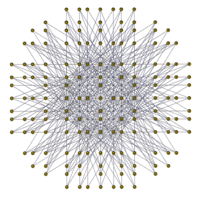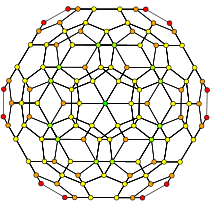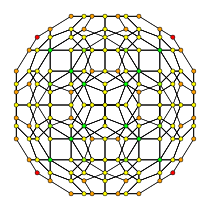Great grand stellated 120-cell
| Great grand stellated 120-cell | |
|---|---|
 Orthogonal projection | |
| Type | Schläfli-Hess polychoron |
| Cells | 120 {5/2,3} |
| Faces | 720 {5/2} |
| Edges | 1200 |
| Vertices | 600 |
| Vertex figure | {3,3} |
| Schläfli symbol | {5/2,3,3} |
| Coxeter-Dynkin diagram | |
| Symmetry group | H4, [3,3,5] |
| Dual | Grand 600-cell |
| Properties | Regular |

In geometry, the great grand stellated 120-cell or great grand stellated polydodecahedron is a regular star 4-polytope with Schläfli symbol {5/2,3,3}, one of 10 regular Schläfli-Hess 4-polytopes. It is unique among the 10 for having 600 vertices, and has the same vertex arrangement as the regular convex 120-cell.
It is one of four regular star polychora discovered by Ludwig Schläfli. It is named by John Horton Conway, extending the naming system by Arthur Cayley for the Kepler-Poinsot solids, and the only one containing all three modifiers in the name.
Images
[edit]| H4 | A2 / B3 | A3 / B2 |
|---|---|---|
| Great grand stellated 120-cell, {5/2,3,3} | ||

|

|

|
| [10] | [6] | [4] |
| 120-cell, {5,3,3} | ||

|

|

|
As a stellation
[edit]The great grand stellated 120-cell is the final stellation of the 120-cell, and is the only Schläfli-Hess polychoron to have the 120-cell for its convex hull. In this sense it is analogous to the three-dimensional great stellated dodecahedron, which is the final stellation of the dodecahedron and the only Kepler-Poinsot polyhedron to have the dodecahedron for its convex hull. Indeed, the great grand stellated 120-cell is dual to the grand 600-cell, which could be taken as a 4D analogue of the great icosahedron, dual of the great stellated dodecahedron.
The edges of the great grand stellated 120-cell are τ6 as long as those of the 120-cell core deep inside the polychoron, and they are τ3 as long as those of the small stellated 120-cell deep within the polychoron.
See also
[edit]- List of regular polytopes
- Convex regular 4-polytope – Set of convex regular polychora
- Kepler-Poinsot solids – regular star polyhedron
- Star polygon – regular star polygons
References
[edit]- Edmund Hess, (1883) Einleitung in die Lehre von der Kugelteilung mit besonderer Berücksichtigung ihrer Anwendung auf die Theorie der Gleichflächigen und der gleicheckigen Polyeder [1].
- H. S. M. Coxeter, Regular Polytopes, 3rd. ed., Dover Publications, 1973. ISBN 0-486-61480-8.
- John H. Conway, Heidi Burgiel, Chaim Goodman-Strauss, The Symmetries of Things 2008, ISBN 978-1-56881-220-5 (Chapter 26, Regular Star-polytopes, pp. 404–408)
- Klitzing, Richard. "4D uniform polytopes (polychora) o3o3o5/2x - gogishi".
External links
[edit]- Regular polychora Archived 2003-09-06 at the Wayback Machine
- Discussion on names
- Reguläre Polytope
- The Regular Star Polychora
- Zome Model of the Final Stellation of the 120-cell Archived 2022-10-10 at the Wayback Machine
